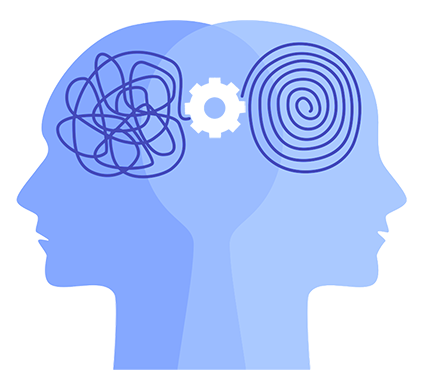In a world that often misunderstands neurodivergent individuals, negative self-talk can become a pervasive issue. Internal dialogue can be harsh and self-critical. Mindful self-compassion offers a powerful tool to counteract this negativity, fostering a more inclusive and accepting self-view.
Evidence-Based Mindful Self-Compassion Therapy
Mindful self-compassion (MSC) is an evidence-based therapeutic approach developed by Dr. Kristin Neff and Dr. Christopher Germer. Their research has shown that MSC can significantly improve emotional well-being and reduce symptoms of anxiety and depression. The science behind MSC lies in its ability to activate the brain’s self-soothing system, which counteracts the stress response triggered by self-criticism and negative self-talk.
Dr. Neff’s pioneering work on self-compassion has demonstrated that individuals who practice self-compassion experience greater psychological health and resilience. Her studies have found that self-compassion is associated with lower levels of anxiety, depression, and stress, and higher levels of life satisfaction and emotional intelligence. Dr. Germer’s contributions have further validated the effectiveness of MSC in clinical settings, showing that it can be a powerful tool for individuals facing various mental health challenges.
Understanding Neurodivergence and Negative Self-Talk
Neurodivergence encompasses a range of neurotypes, each with their own nuances and differences. These conditions often come with unique strengths and challenges. Unfortunately, societal discrimination and lack of inclusion can lead to feelings of inadequacy and self-doubt among neurodivergent individuals.
Negative self-talk is a common issue, where individuals internalise societal biases and criticisms, leading to a detrimental impact on mental health and self-esteem. This is where mindful self-compassion can make a significant difference.
What is Mindful Self-Compassion?
Mindful self-compassion combines mindfulness and self-compassion to help individuals treat themselves with the same kindness and understanding they would offer a friend. It involves three main components:
Self-Kindness
Being warm and understanding toward oneself during times of pain or failure, rather than being harshly self-critical.
Common Humanity
Recognising that suffering and personal inadequacy are part of the shared human experience.
Mindfulness
Holding one’s painful thoughts and feelings in balanced awareness, rather than over-identifying with them.
How Mindful Self-Compassion Helps Neurodivergent Individuals
Reduces Negative Self-Talk:
By practicing self-kindness, neurodivergent individuals can learn to counteract the negative self-talk that arises from societal discrimination and internalised stigma.
Promotes Inclusion
Recognising common humanity helps neurodivergent individuals feel less isolated and more connected to others, fostering a sense of inclusion.
Enhances Emotional Resilience:
Mindfulness allows individuals to observe their thoughts and feelings without judgment, reducing the emotional impact of negative experiences and enhancing resilience.
Practical Tips for Practicing Mindful Self-Compassion
Mindful Breathing
Take a few minutes each day to focus on your breath. This simple practice can help center your mind and reduce stress.
Self-Compassion Break
When you notice negative self-talk, pause and ask yourself, “What would I say to a friend in this situation?” Offer yourself the same kindness and understanding.
Loving-Kindness Meditation
Spend a few minutes each day silently repeating phrases like “May I be happy,” “May I be healthy,” and “May I be at peace.” This practice can cultivate a sense of self-compassion and well-being. The use of compassionate language “May I…” is rooted in both psychological and neuroscientific principles.
The phrase “May I be OK” is a form of self-compassion, which involves treating oneself with the same kindness and understanding as one would offer to a friend. Research by Dr. Kristin Neff, a pioneer in the field, has shown that self-compassion is linked to lower levels of anxiety and depression and higher levels of life satisfaction and emotional resilience. Using compassionate language helps in cognitive reframing, a psychological technique that involves changing the way one thinks about a situation. By saying “May I be OK,” individuals shift their focus from self-criticism to self-kindness, which can reduce stress and improve emotional regulation.
The science behind Self Compassionate language
Neuroplasticity
The brain’s ability to reorganise itself by forming new neural connections is known as neuroplasticity. Repeatedly using compassionate phrases like “May I be OK” can strengthen neural pathways associated with positive emotions and self-acceptance. This can lead to long-term changes in how one responds to stress and adversity.
Activation of the Parasympathetic Nervous System
Compassionate language can activate the parasympathetic nervous system, which is responsible for the body’s rest-and-digest functions. This activation can reduce the physiological symptoms of stress, such as a racing heart or shallow breathing, promoting a state of calm and relaxation.
Oxytocin Release
Engaging in self-compassionate practices can stimulate the release of oxytocin, often referred to as the “love hormone.” Oxytocin is associated with feelings of warmth, safety, and connection, which can counteract the effects of cortisol, the stress hormone.
In the context of Mindful Self-Compassion, phrases like “May I be OK” serve as a form of self-soothing. They are often used during meditation or moments of emotional distress to cultivate a sense of inner peace and self-acceptance. This practice can be particularly beneficial for individuals dealing with high levels of stress, anxiety, or self-criticism.
Mindful self-compassion is a transformative practice that can help neurodivergent individuals overcome negative self-talk and foster a more inclusive and accepting self-view. By integrating self-kindness, common humanity, and mindfulness into daily life, neurodivergent individuals can build resilience and improve their mental health.
If you or someone you know is struggling with negative self-talk that can occur in all neurotypes, consider exploring mindful self-compassion. For more information and support, visit our website or book an appointment with Karen Merry, a qualified counsellor specialising in neurodivergent support.

